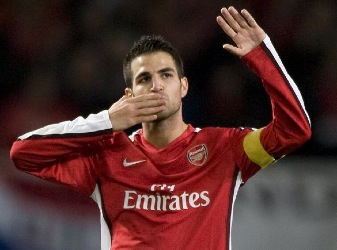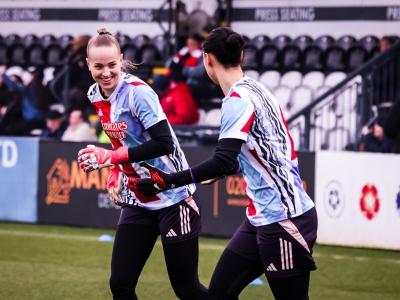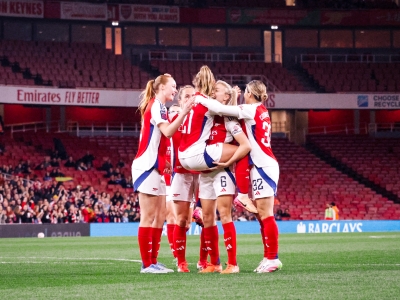There doesn’t seem much point in holding off writing this. The official announcement will come when the fee is agreed, but the writing has been very much on the wall since Cesc Fabregas’ effective ‘come and get me’ interview last week. The Arsenal captain is going to Barcelona, and he’ll be unveiled in the blue and red before the World Cup. Arsenal, if they are cute, may attempt to delay the announcement of the deal until the June 1st season ticket renewal date has passed, but this is one Catalan that’s out of the bag.
For me, the player’s position was crystallised in the Champions League quarter final this season, against the team he will be lining up for after the World Cup. In the first leg, driven on by himself, playing with a fractured leg, the team managed to pull themselves back into a game in which they should have been dead and buried. Fabregas must have wondered what the hell was going on in the first hour of the game when the visitors ran riot. Sitting in the directors’ box for the second leg, it must have all made sense. Arsenal were beaten out of sight and unable, even with a one goal lead, to play with enough tactical intelligence or ability to get the required result. It was a salient and painful reminder that, continuing to play in one of the sides he was watching, he would be surrounded by cut price dross. In the other, trophies beckoned.
Few can blame the player for wanting to move now. Why wait for Arsenal to sort their act out? The football can be wonderful, but only when matched by the determination and work rate fleetingly glimpsed at the beginning of the season just gone is it going to lead to trophies. The team is by and large a little too young, and a little too arrogant, a quality that the manager must take responsibility for. Too often they have shown little in the way of character, a trait they are highly selective about demonstrating. The league game against Stoke in February gave us some hope, but they couldn’t keep it up. Critically, the defeats to Manchester United and Chelsea this season exposed the true qualities of the current side. They just can’t win the big matches, when the gap between potential and proven appears to be an unbridgeable chasm.
What worries now is the potential decline. In 1980, the team took years to recover from the sale of Liam Brady to a glamour continental club, where the player won the silverware his abilities merited. The fear now is that a repeat is on the cards. Seasons of mediocrity, as it becomes obvious the manager’s powers have waned, before he finally departs. I found this quote from Arsene Wenger yesterday while looking up Fabregas’ quote to Marca. It’s from 2007 when, having sold Thierry Henry to Barcelona, Wenger was asked to explain the philosophy for the next stage of his career. This is what he said…
“When we decided to build the stadium I wanted to anticipate the possibility of financial restrictions, so I concentrated on youth. I also felt the best way to create an identity with the way we play football, to get players integrated into our culture, with our beliefs, our values, was to get them as young as possible and to develop them together. I felt it would be an interesting experiment to see players grow together with these qualities, and with a love for the club. It was an idealistic vision of the world of football.”
Idealism. That’d be right. An idealistic view that players would stick around through some sense of loyalty to the manager and the style of football, a style of football that has proven one thing – you can’t win trophies without being able to defend as a team. Another word for it is naivety. As for describing it as an ‘interesting experiment’, that’s not what I pay £1200 a year to watch. What Wenger has ensured, through all the contract extensions to players that are evidently not up to the mark, is that the club have a handful of Winston Bogardes. Players that will never command similar wages elsewhere because they are simply not good enough, and who will hang on at Arsenal like a bad smell and see out their deals until they expire. The cream of the crop – the ones the club actually need to keep – are the only ones that will be offered better wages by suitors and will press for a move.
Sure Arsenal will get a hatful of money from Barcelona for Fabregas. But the player is more or less irreplaceable. The manager played the whole of last season with a 4-3-3 formation to get the best out of his captain, so one assumes it’s back to 4-4-2 now. Certainly, to keep the fans onside, some big names will need to come in this summer, and the Barcelona money will help fund them. However, if the manager continues to buy potential rather than experience, there can only be a backlash.
The real question that needs to be asked is why the club’s best player wants out. The answer is simple. He doesn’t fancy his chances of adding to his solitary FA Cup winner's medal for six years’ first team service surrounded by mediocre players. The question that follows is how long supporters are prepared to pay top dollar to watch said players. And how long the board will tolerate a manager who sets such store by evident mediocrity. 2010/11 could be a long, painful season.
As for Fabregas. No-one could doubt his commitment to Arsenal when he wore the shirt. And I am far from convinced he would have left this summer if he genuinely believed Arsenal could win something next season. Perhaps the manager has outlined his plans for incoming transfer targets and his captain is far from impressed. One thing’s certain. Without Fabregas, the chances of a trophy are even less.
_________________________________________
The 2010 Gooner Survey is now available if you prefer to vote online rather than send in the form that is printed in our current issue. Details can be found here.







